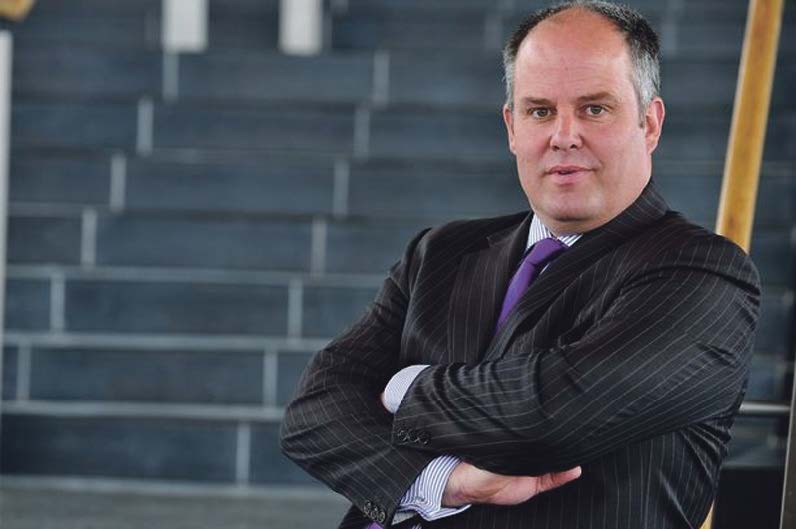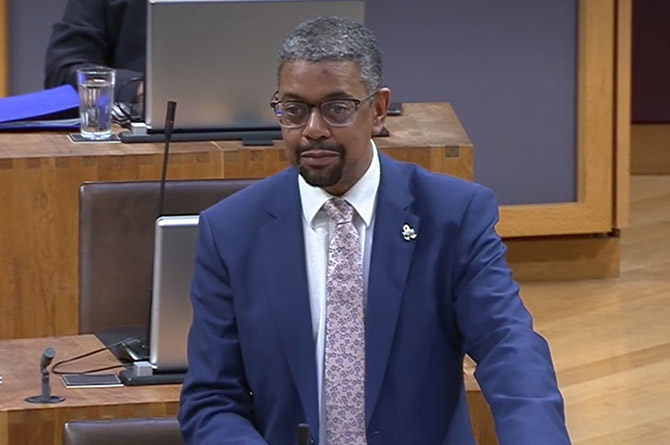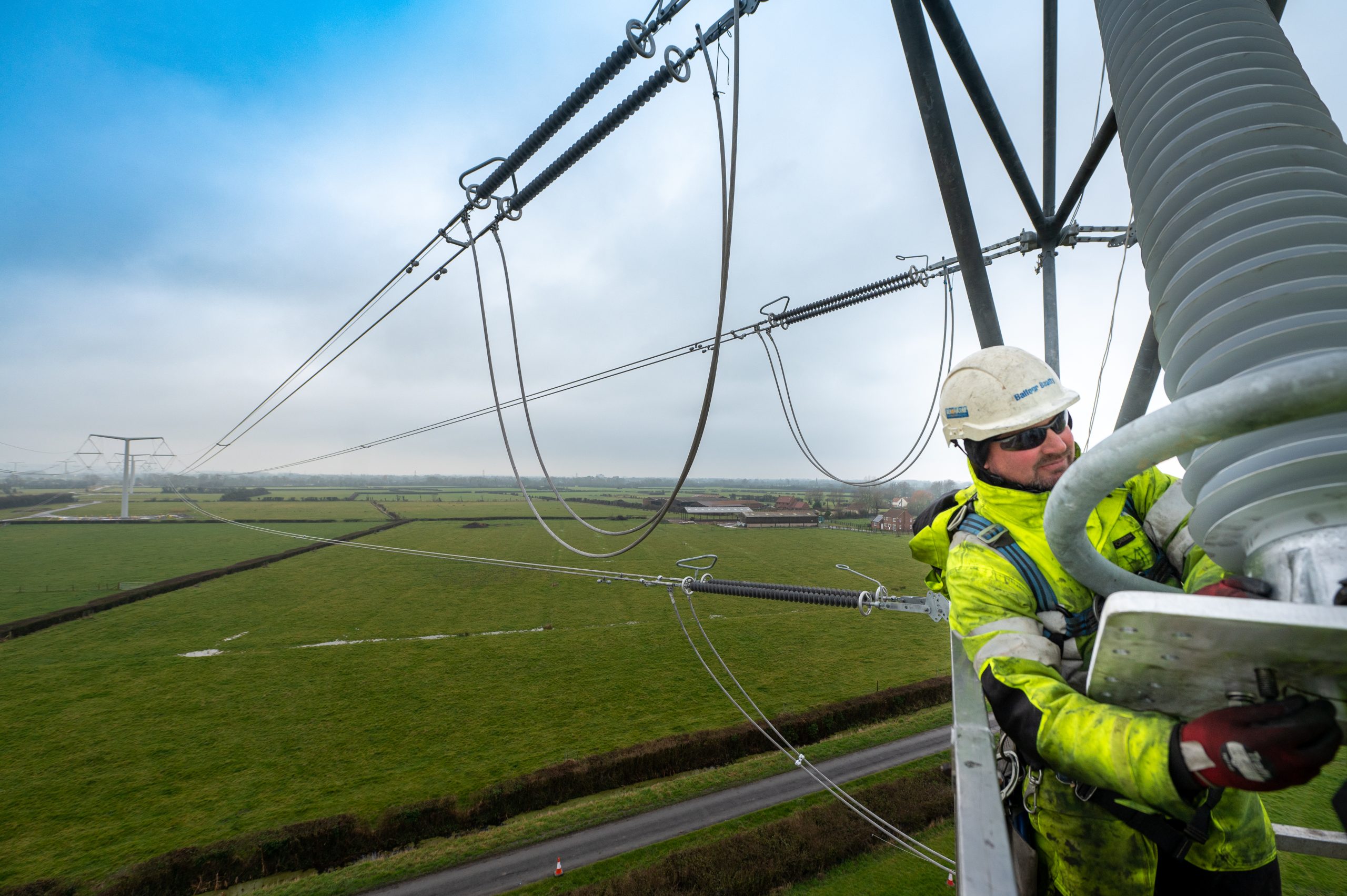Politics
Conservatives take aim at own Achilles Heel

by Jon Coles
ANDREW RT DAVIES, the new and combative Conservative Shadow Health Minister, stepped into new territory for him and the Conservatives in Wales this week.
In recent weeks, the Conservative group in the Senedd has stepped up its attacks on the Welsh Government’s handling of the COVID-19 crisis, highlighting instances where Wales has failed to follow the Westminster Government’s lead on policy decisions.
TURNING A BLIND EYE
With Westminster’s current response to the COVID crisis at sixes-and-sevens, the Shadow Health Minister put in his boot to criticise the Welsh Government for following Westminster’s lead on a contentious policy decision.
In March, the Westminster Government – followed by the UK’s devolved administrations – began discharging hospital patients into care homes. Discharged patients were not tested for coronavirus.
The Herald reported on the scandal at the time. We highlighted instances where care providers, in both Wales and England, were pressurised by health boards and trusts to take untested patients into closed residential settings.
The outcome of that disastrous policy decision was easily predictable. Its likely consequences were well-known – at least by the Westminster Government – at the time it made that decision.
Introducing a virus known to be lethal to vulnerable and elderly patients caused a wave of deaths in care homes across the UK. The virus spread among an isolated and largely defenceless population.
The foreseeable result was a calamity.
Deaths in social care settings spiralled. They remain high even after the first spike of the virus in the general population and its decreasing incidence across the UK.
Wading into the scandal this week, Andrew RT Davies criticised Welsh Government without a moment’s apparent reflection on the wider context of his words.
In a press release, Mr Davies commented: “There can be no excuse for such an ill-thought decision which, of course, will have had a profound impact on some of our most vulnerable in care homes. I cannot comprehend where the government’s thought process was in pushing care homes to accept hospital patients who had not received a COVID-19 test.
“The bullish act by the Welsh Labour-led Government in applying pressure is truly scandalous and as a result, the people of Wales deserve an apology.
“The most pressing question now is to address how many patients were infected after being admitted and then discharged from the hospital. To address people’s serious concerns, this must be a priority for the Welsh Labour-led Government.”
On receipt of the press release, we replied and asked whether Mr Davies wished to extend his tart observations about the discharge of untested hospital patients to include the Westminster Government.
After recent press releases in which the Conservatives have not hesitated to compare Wales unfavourably with England, we believed Mr Davies might reflect and provide a balanced response: possibly to praise the Welsh Government for following Westminster’s lead; possibly to take the chance to even-handedly criticise the Westminster Government’s policy which the Welsh Government followed.
We did not receive a reply.
POLITICISING A PANDEMIC
Over recent weeks, the Conservatives have ramped up partisan rhetoric over the Welsh Government’s handling of the COVID-19 pandemic.
Former Shadow Health Minister, Angela Burns, managed to navigate a path between scoring political points and attacking the Welsh Government for its multiple early failings in Wales’ response to the virus.
Those failings include setting a testing target, failing to secure the testing kits necessary to meet the target, saying a testing target didn’t exist, announcing a revised testing target, and then abandoning testing targets altogether.
On each of those, Mrs Burns made telling points and held Wales’ Health Minister, Vaughan Gething, to account – often leaving him wriggling on a hook made of his own contradictions and evasions.
Similarly, when Wales entered the strictest phases of lockdown, Paul Davies was able to highlight the enormously disproportionate impact of them on Wales’ rural economy without indulging the fantasy that somehow things were any rosier over the border.
As the Westminster Government began to ease lockdown restrictions in England, and under pressure from both the Westminster Government and Conservatives on either side of Wales’ border with England, the tone of Conservative briefings changed sharply.
Repeated releases from the Conservatives demanded that the Welsh Government lift the lockdown in Wales in step with England. The Welsh Government was accused of ‘dither and delay’, the phrase ‘catch-up Cymru’ began to appear. Fighting talk appeared in the names of shadow ministers who previously expressed themselves cautiously, occasionally critically, and usually constructively.
With one eye on the next round of elections to the Senedd, the Conservatives moved away from consensus and criticism to outright attack.
Having watched the reopening of schools in England unravel into chaos, Conservative attacks on the reopening of Wales’ schools lost step with reality. Now, the Welsh Government was criticised for taking steps that England failed to take to keep schools open there. The desperate floundering of Westminster’s Conservative Education Minister, Gavin Williamson, stood in stark contrast to the determined and unflustered approach of his Welsh counterpart, Kirsty Williams.
Darren Millar, the Senedd Member charged with speaking for the Conservatives on COVID in Wales, began to speak of Wales’ failings – and particularly those of the Welsh Government – for not reopening pubs, restaurants and holiday accommodation. With Wales’ hospitality and tourism industries on their knees, it appeared that approach would serve the Conservatives well.
As the easing of lockdown in parts of England has unravelled, however, Mr Millar has gone noticeably quiet as Wales continues to lift restrictions now re-imposed in significant areas of England’s north-west.
The Prime Minister’s warnings of the risks of a second wave of the virus should focus Conservatives in Wales’ attention on what preparations the Welsh Government is making to head-off that eventuality or at least ease its impact if or when it arrives. Instead, Andrew RT Davies is fighting four-month-old battles seeking headlines.
CONSERVATIVES NOT ALONE
One of the features of the crisis has been how Plaid Cymru has used it to propel its own message for an independent Wales – or at least a Welsh legislature with far stronger powers than the current arrangements.
‘Westminster doesn’t work for Wales’ is how Plaid has pitched its message. Its fire is concentrated on the shambolic approach of the Westminster Government’s response to the crisis. The Prime Minister’s endless capacity to make up policy on the hoof when caught out or tell outright lies when questioned about details has given Plaid Cymru ample opportunity to illuminate the gap between Westminster’s rhetoric and reality.
The Westminster Government’s hectoring approach to the UK’s devolved administrations, which includes gazumping the Welsh Government on a deal for testing kits with pharmaceutical giant Roche, and its constant inconstancy and inconsistency has also allowed Plaid to deploy
its choir of voices demanding more autonomy – preferably independence – for Wales.
When attacking the Welsh Government, however, Plaid has taken a different approach to the Welsh Conservatives. It has clamoured to keep restrictions in place – for example on schools – and for existing restrictions to be strengthened and reinforced – for example on face coverings, a policy on which it is eerily close to the Conservatives’.
However, Plaid – and the Conservatives – have fallen well short of saying what they would have done differently in the same situation and what they would do now to improve things during the continuing COVID age.
ONE EYE ON THE ELECTION
By the time next May comes around, both of Wales’ principal opposition parties need to set out defined messages that are both less negative and more grounded in current reality if either is to shift Labour from power in Cardiff Bay.
For the Conservatives, the challenge is finding a voice for Wales which is not an echo of Westminster. The events of recent weeks demonstrate that efforts to reform the Conservatives in Wales to forge a distinct identity from the UK party are likely to be seed falling on stony ground. Darren Millar is Boris Johnson’s representative on Earth and Simon Hart his rock. A more constructive approach from the Conservatives is, therefore, highly unlikely.
For Plaid Cymru, the challenge is moving beyond dreams of jam tomorrow in favour of policies for today. Plaid need to focus less on what Westminster isn’t doing for Wales but what Plaid CAN deliver for the whole of Wales and not just its existing voters. Plaid’s problem is systemic. It lacks resources and, while it well-organised in pockets of Wales outside ‘Y Fro’, it has not found the key to unlock monoglot Anglophone voters in sufficient numbers across Wales.
As for Labour in Wales, all it can promise is more of the same. It’s been in power for over twenty years and it isn’t likely to change a formula that’s kept it in power for so long. And, when it comes to the economy, Labour can point out that the big levers are held by the Exchequer in London.
The Conservatives and Labour have the advantage of a large electoral base across most of Wales. If they can energise those voters to turn up and vote next May in anything like the numbers they did in the General Election, Plaid will have to watch out for a massive squeeze on their far smaller electoral base
News
Gething warns of ‘fragility’ of Welsh devolution

THE FIRST Minister warned that devolution remains fragile as Senedd members reflected on the 25th anniversary of the first election to the then-National Assembly.
Vaughan Gething described the findings of an independent commission on Wales’ constitutional future as a “wake-up call of the fragility of devolution as we know it”.
Mr Gething said the report highlights the opportunity costs of doing nothing to actively improve democracy and civil engagement in Wales.
He told the chamber, also known as the Siambr: “We have real challenges before us, and we cannot ever be complacent about our ability to achieve more for Wales.
“A better future for Wales needs us to take action and continue the devolution journey.”
The First Minister highlighted “successes” of devolution so far, including carrier bag charges, free prescriptions, Wales’ opt-out system for organ donation and a new curriculum.
Andrew RT Davies criticised those on the right of Welsh politics – including some in his own party – who argue the Senedd should be abolished.
“I don’t agree with that,” said the Tory group leader. “And I will argue every time with anyone who says that Wales should put its parliament to one side and go back to a 1950s, 1960s model of government. That’s not the modern Wales we want to see.”
Mr Davies disagreed that devolution sets a trajectory towards inevitable independence as he called for a relentless focus on utilising current powers to improve people’s lives.
Raising concerns about low turnout, he said the legitimacy of the Welsh Parliament will grow if a greater proportion of people vote in Senedd elections.
He said: “There is a lot of work to do and the big job of work is to get the people of Wales engaged as to what we can do as a parliament and what you can do as a government.”
Rhun ap Iorwerth called for more innovation in the delivery of public services in Wales, with devolution providing a buffer against the headwinds of Westminster and beyond.
The Plaid Cymru leader highlighted that Wales Governance Centre data shows a majority of people want more devolution, with support for independence almost tripling since 1999.
He urged the Welsh Government to carve a distinct path for constitutional change in Wales.
Mr Iorwerth lamented missed opportunities to make strides towards tackling challenges around the economy, health, education and child poverty.
He said: “Let us ensure the next 25 years focus on proving the true value of devolution, by tackling those challenges … and strengthening our democracy.”
Jane Dodds paid tribute to former Lib-Dem members Mick Bates and Aled Roberts, two “very loyal and committed public servants”, who died in recent years.
The Lib Dems’ leader in Wales pointed out that her predecessor, Kirsty Williams, guided backbench legislation on nurse staffing levels through the Senedd onto the statute book.
Ms Dodds, who represents Mid and West Wales, told the chamber her mother was part of a stakeholder group that helped in the development of the then-Assembly.
“She wasn’t a politician at all; she was a community agitator,” she said. “And that’s where, I think, we should be going back to: listening to those community agitators, making sure that we involve everybody across Wales….
“We have an awesome opportunity to continue to change Wales, to make it more radical, progressive, surprising and inspiring, but we do need to get back to listening.”
Vikki Howells, a Labour backbencher who represents Cynon Valley, said it should be a matter of pride that the Senedd has not only endured but matured.
The former history teacher at Caerphilly’s St Cenydd Comprehensive said: “It’s not always been an easy journey, but we all owe a debt of gratitude to those who came before us and worked hard to establish a confident, outward-looking parliament.”
Luke Fletcher, who was three at the time of the 1999 election, pointed out that a generation has grown up with the Senedd.
The Plaid Cymru MS for South Wales West stressed that delivering improvements to people’s lives must be the focus of the next 25 years.
John Griffiths, who is one of the four sitting members first elected in 1999, called for new constitutional arrangements to recognise the reality of a devolved UK.
Adam Price, the former Plaid Cymru leader, raised concerns about low turnout, with less than half of the electorate voting in the six Senedd elections since 1999.
He said “I think the failure to achieve more than 50% turnout in any of the elections since the creation of the institution is a problem that we have to solve, isn’t it?
“Because the longer that continues, the more it will erode the legitimacy but also the effectiveness of this institution.”
Mr Price, a former MP, who represents Carmarthen East and Dinefwr, urged Wales to introduce mandatory voting for the 2030 election.
Mr Gething said he personally supports compulsory voting but the Welsh Government does not yet have a fixed position, suggesting it is not among his administration’s priorities.
Heledd Fychan, the Plaid Cymru MS for South Wales Central, highlighted that Wales was the first UK nation to introduce free access to museums.
She said: “It was a huge success; within a year, we saw an increase of 88% in those accessing our national collections, going from 764,599 to 1.4 million, which is incredible.”
Samuel Kurtz, the Conservative MS for Carmarthen West and South Pembrokeshire, who was seven in 1999, urged the public to have their say at the ballot box.
Closing the statement on May 7, Elin Jones, who is the speaker or Llywydd, stressed that it is the people’s Senedd, not a politicians’ parliament.
She said: “We were elected to look forward, and to plan for the future, and that’s what we’re doing here, for the next 25 years, and, indeed, the next century.”
News
Teifi Valley pylon concerns raised in Parliament

BEN LAKE MP has urged the UK Government to make underground cabling the default method for installing new electricity grid infrastructure.
There are 4,500 miles of overhead electricity transmission lines in England and Wales. This contrasts with just over 900 miles of underground cables. ‘Undergrounding’, the replacement of overhead cables with underground cables, is used in limited circumstances, such as in nationally designated landscapes.
There have been calls for an increase in undergrounding. However, the government has pointed to several issues, including the higher cost of placing cables underground when using traditional open trenching methods. However, recent advancements in cable ploughing techniques have significantly reduced the cost of placing such cables underground, such that MPs are calling on the UK Government to adopt the method as their preferred approach to new grid infrastructure.
Green GEN Cymru is proposing a new 132kV overhead line to connect Lan Fawr Energy Park in West Wales to a new National Grid substation in Carmarthen. As part of the initial consultation process, significant concerns were raised by residents and businesses about the visual, environmental, and economic impact of the proposed overhead line – with several public meetings and campaign groups forming over recent MONTHS to oppose the proposals.
Concerns over the proposed Tywi Teifi network have previously been raised in the Senedd and last week Ben Lake MP reiterated calls for the undergrounding of transmission cables during a debate in Westminster Hall on Pylons and upgrading the National Grid.
During his speech Mr Lake stated: “What’s at heart here is this idea of just transition – of balancing the concerns of communities with the need for new infrastructure. Although definitions of just transition differ, my understanding of the concept is that it should see to bring about fairer outcomes from the transition to net zero by maximising the benefits of climate action and minimising the negative impact for communities.
“We all agree that the National Grid needs upgrading. It needs strengthening, but it is disappointing that the Government has, thus far, failed to truly consider the benefits and advantages of cable ploughing techniques.”
Mr Lake argued that installing transmission cables by using cable ploughing techniques, such as is used by a local company based in Pencader (ATP), could drastically reduce the cost and time taken to complete infrastructure upgrades.
Mr Lake added: “Cable ploughing could be a means of balancing the need for any new electricity infrastructure with the importance of minimising not only financial costs, but also unnecessary environmental impact and community opposition.”
Climate
Turbine near Rhosygilwen Mansion would cause ‘significant harm’

A £1M scheme for a ’20-storey-high’ wind turbine at a Pembrokeshire mansion is recommended to be turned down later this week despite being twice backed by the council’s planning committee.
Mr and Mrs Glen Peters of Western Solar Ltd are seeking permission for a single turbine on land near the Grade II-listed Rhosygilwen Mansion, which includes an arts and functions building known as Neuaddydderwen.
Planners have repeatedly been recommended to refuse the scheme by officers, but backed it at both their March and April committee meetings.
The March backing meant the application returned to the April meeting for ratification after a ‘cooling off’ period; the application having been deferred at the January meeting pending a site visit.
It was initially recommended for refusal in January for several reasons, including potential harm to the setting of the Grade-II-listed house and grounds, and fears of threats to the safe operation of West Wales Airport at Aberporth in neighbouring Ceredigion, some 9.5 kilometres away.
The last concern was later withdrawn.
Officers have said the scheme “would not protect or enhance the setting [of Rhosygilwen] but rather would result in significant harm to this interest of acknowledged importance”.
They have also warned any backing of the scheme against policy recommendations could set a precedent for similar developments.
Applicant Glen Peters has previously said the application for a turbine would ensure the long-term viability of Rhosygilwen, acquired some 30 years previously as a fire-damaged house that was about to be pulled down.
He has said that, despite 200-year-old Rhosygilwen using power from its solar farm, the first of its kind in Wales, it has been hit with “huge increases in importing energy from the grid” during the winter months.
Speaking at the April planning meeting, Mr Peters said the scheme as a whole was expected to cost “the best part of £1m”.
Objector Paul Robertson-Marriott has said the “20-storey” turbine would have “a detrimental impact” on surrounding properties.
He said the majority of the power from the existing solar farm was fed into the grid rather than powering the house, believing the turbine proposal would “ride roughshod over the status of the listed building for economic benefit”.
He asked members: “Why should the local community and environment be subject to an additional economic generator that causes environmental depredation?”
As the scheme would be a departure from the development plan it means it will have to be decided by full council, meeting on May 9, where it is recommended that council does not endorse the resolution of the planning committee, and refuses the application based on “significant harm” to the setting of Rhosygilwen.
-

 News6 days ago
News6 days agoBeautiful, funny and lovely: Family pay tribute to Sian Batchelor
-

 Community2 days ago
Community2 days agoJoy as Willow rescued by coastguard after 12-day ordeal
-

 Community4 hours ago
Community4 hours agoTragic passing Josh, 28, mourned by Milford Haven community
-

 Business3 days ago
Business3 days agoDragon LNG explores integration of LNG and CO2 liquefaction processes
-

 News5 days ago
News5 days agoBody recovered confirmed to be Luke Stephenson, say police
-

 News7 days ago
News7 days agoTigers second division Cup Champions
-

 News2 days ago
News2 days agoMilford Haven RFC celebrates Mini’s Section Presentation
-

 News2 days ago
News2 days agoFishguard & Goodwick RFC Under 14’s triumph in Plate Final

























